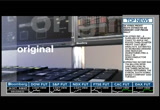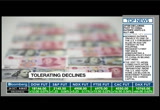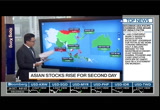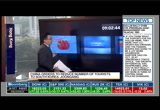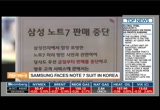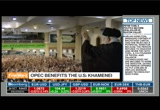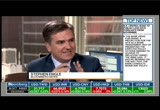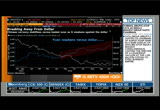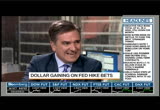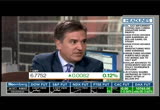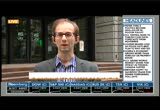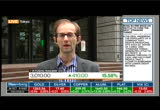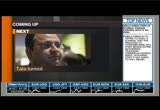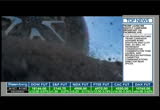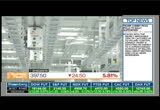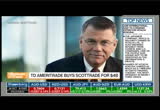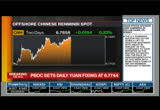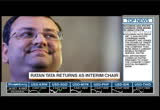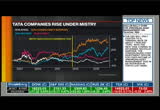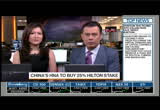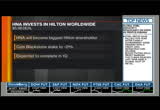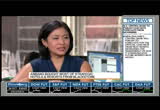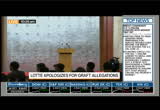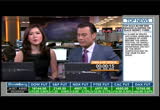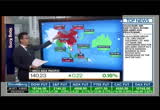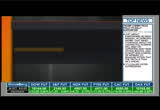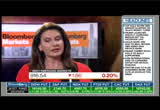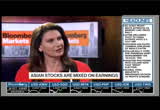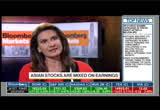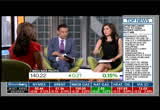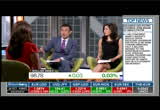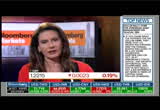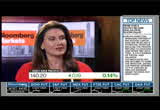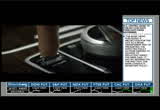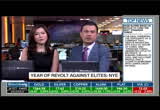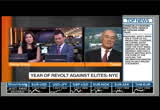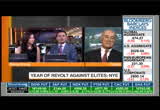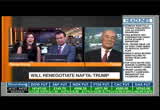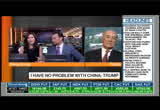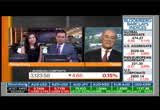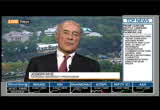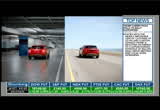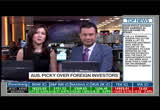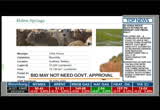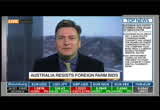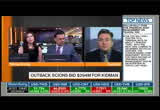tv Bloomberg Markets Asia Bloomberg October 24, 2016 9:00pm-10:01pm EDT
9:00 pm
9:01 pm
policy makers may accept declines in weak exports and the strength of the dollar. > and turmoil. >> just about what, 29 minutes away from the start here in hong kong and indeed in shanghai. >> asian stocks hitting a two-week high. we also have the southeast asian markets coming online now. how's it going? >> well, mostly going well. it's been going well for two days now. despite the fact you have, you have a weak spot which i'll talk about in a moment. second day of gains. volumes aren't quite there yet. a loft earnings coming through and guess what? deals again making the news. wonder what kind of speculation is going around. what the next targets are going to be. but on the way up following a higher close on wall street overnight. malaysia a little bit of weakness at the moment.
9:02 pm
kospi index 0.7 lower. an interesting story in south korea. g.d.p. reports better than expected. and that said, what seems to be driving the market at least one part of the market right now is this report out of south korea that china has ordered a reduction in the amount of tourists going to south korea. let me look. here we go. consumer services. you have the travel related shares down 2.3%. you also have some of the retailers. let me go back here. the retailer, the things people go through south korea for and buy, kind of love that by the way. some of the other, health care for example 2.5% falling right now. continue to follow this story. only one line we have.
9:03 pm
ery quickly, obviously looking at the japanese yen here. on the back we have the dollar strength. 78/69 is your level for the chinese offshore currency and dollar/yen is back way above 104. 104.50 weakest level for the japanese yen against the dollar since july. wonder how far this goes, guys. > thanks, david. >> south korea grew more than four in the three months since september as there are disappointing exports and consumption. g.d.p. expanded 0.7 from the previous three months beating estimates. it is not clear how long construction deproth will continue as the government seeks to reign in swelling household debt. samsung is facing legal action on home turf over the note 7
9:04 pm
smartphone. more than 500 users have filed a class action suit demanding compensation for time and effort lost when the phone was recalled and then scrapped. the legal firm says it plans to file a new suit every month saying note 7 owners are angry. the korean suit follows a similar case in the u.s. >> the note 7 exchange policy forces users to choose only samsung products and those who continuousing the note 7 are not fully compensated. this is an infringement of consumers' rights to choose their phones. >> there is an agreement with the eu despite the agreement with canada falling into disarray. the canadian pact was supposed to be signed this week but has been blocked by a region in belgium. the australian trade minister told the morning herald the company may have to accept a smaller deal approved by the eu commission alone. the supreme leader of iran has accused opec of using cheap
9:05 pm
energy to benefit the united states. ayatolla hue many says global prices form a coercive measure against those independent of washington and noted the . cusations in 1973 oil crisis he says they are again using oil as a weapon. global news more than 24 hours a day in more than 120 countries. this is bloomberg. >> thanks for that. >> let's get back to our top story in the asia pacific this morning. policy makers in china are signaling once again that ey're willing to allow the yuan -- >> we saw the yuan offshore sinking to a record low overnight. is there a sense of global panic? >> not yet. >> talking more and more about it. the mood is changing. >> they've actually let the
9:06 pm
yuan against the dollar slide gradually so it is not the appreciation we got last august that sent the markets into a tizzy or the beginning part of this year when the outflows really started picking up and the yuan also started to depreciate quite fast. >> we have a chart. >> we do. this tells us why there is not as much panic this time around. against the dollar, sure. this could be attributed to the dollar strength as the yuan has weakened there. that red band is the weakness of the yuan versus the dollar. but the circle part down there since june at least we've had relative stability of the yuan against the basket of currencies including the euro shall the yen, and others. that is the reason there is not as much volatility. basically the offshore yuan touched the lowest level overnight in new york as far as
9:07 pm
data back to 2010. onshore it is also weakening against the dollar the lowest in six years. and it is interesting. you can see why that they're allowing this. since october 1 that just happens to be when the yuan was included in the i.m.f. basket. since october first the yuan has weakened against the dollar every session except for one. >> as you said a lot of this is on dollar strength. it sort of takes a little bit rhetoric we've heard that there is no basis for sustained depreciation. how much will officials be willing to tolerate? >> that's why we need to look at the reference rate coming up in about 10 minutes' time from now. you can pretty much determine when the authorities see a floor, right? i'm not saying they are intervening or controlling the currency but it is pretty clear if they set the reference rate in a certain way.
9:08 pm
yesterday it was 6.6790 and it weakened further during the session. we'll look at those numbers in about 10 minutes' time. exports are down more than expected in september down 10% in dollar terms. they need this help. >> they have these outflows here. it is difficult to get your money out of the country. >> yes, it is very difficult. there are many nefarious ways to get your money out of the country but there are also, you know, tightened up the capital controls as well. but look at this. the state administration of foreign exchange is the foreign currency regulator in china. they are reporting net outflows reached 44.7 billion in september the most since the government started revealing those figures in 2010 to the public. goldman saks just on friday said outflows have been about $500 billion so far in 2016. so to come back to your
9:09 pm
question how much are they going to allow the yuan to weaken? the bigger question is how much are they going to allow the outflows to continue and how much the threshold that will allow that? >> the sentiment that might prompt another outflow and the yuan will continue to weaken. thank you so much for that. rishaad: they are surging on their debut today in tokyo. this is the third biggest ipo in the world so far this year raising $4 billion. >> $4 billion. quite a debut. bloomberg's chris cooper is at the tokyo stock exchange taking a look at all this. it has been a positive reception to say the least, chris. chris: yes. they did very well on their debut here. it's been a massive turn-around for the company. this is a company, the first ipo of one of the j.r. companies in almost 20 years. when it was first split up from its brothers and sisters it
9:10 pm
didn't look like it was going to survive very well. 30% of the sales in the railway business were the size of its osses. it had a huge turn-around that led to the ipo today and you can see the big surge in the shares on the first day. rishaad: what about future prospects of the company, really, which has now got ambitions with the money they're raising? chris: right. one thing to remember about of money raising is none the money will go to kyushu. the owner of the railway is the government and the money will go to the government at this point. if there is any future raising by kyushu it could do that. it has the option now. it does have ambitions though. you're right. it's looking at southeast asia. we recently interviewed the chairman and he said he is looking to invest in hotels and
9:11 pm
residential buildings in southeast asia. now, one thing to remember with kyushu, it is on an island, 13 million people. it doesn't have a very large population. and it's shrinking. so what it's doing now is looking for tourism. it's looking to invest overseas. it's got five restaurants in shanghai. it's got a ferry that goes to south korea. it's looking to really tap into that inbound tourism and the growth in other parts of asia. rishaad: chris, thank you very much. chris cooper for us outside the tokyo stock exchange on that day bufe the third biggest ipo this year. >> and certainly that ipo and some of the flurry of deals over the past few hours have lent some excitement when it comes to these asian markets doing pretty well today. still ahead we'll head to japan . rishaad: going to be asking professor joseph nye about what
9:14 pm
>> it is 14 minutes past 9:00 in singapore. exactly 14 minutes into trading there. what a gloomy day when it comes to the lion city. asian markets are up about 0.25. looking in australia pretty strong buying, 0.7% there. crude not doing much for some of the players leading those gains. that weaker yen is boosting apanese stocks exporters doing particularly quite well. the kospi lagging the rest. rishaad: quick check of the business headlines. apple supply, low inventories there feeding a rally in chip prices. operating profit coming in $642
9:15 pm
million through the end of september comparing with the average estimate of what, $580 million at bloomberg. now semiconductor prices have been surging this year. apple releasing the new iphone, chinese makers adding premium components. also to stimulate sales. >> an easy deadline for information about its proposed $43 billion takeover. that sent shares of the swiss company tumbling. the eu now has until friday to green light the deal or open an extended phase two inquiry that could delay final approval for months. along with the eu investigation there are other questions as chem china faces its own possible merger at home. rishaad: tv amer trade falling by 14%. the consideration here is $4 billion combining two of the largest online brokerages. it is expected to close next year. has ng the family business
9:16 pm
rinny up the rich list. he'll be worth $4 billion. >> we've been waiting for this breaking news from china just crossing now. david, what is this telling us? steve, rather, has the breaking news. >> we got the fixing rate. it is a little bit weaker from yesterday's fixing rate and just about in line with where the yuan closed yesterday. the rate set by the pboc at 6.7744 to the u.s. dollar. it closed at 6675.2 so pretty much in line with yesterday's close. it is weaker against the dollar than yesterday's close. so that indicates a further allowance if you will of a weaker yuan. yesterday's reference was 6.7690. now it's 6.7744. again, it looks as though the authorities in china are allowing a weaker yuan.
9:17 pm
it has weakened against the dollar ev session this month. of course the first week was closed because of the holiday but it has weakened against the dollar every session except for two if i look back in the bloomberg terminal. they are allowing or at least it seems like they are allowing the weaker yuan since the inclusion of the yuan into the i.m.f.f.d.r. basket. overnight we saw the offshore yuan reach a record low against the dollar. actually that dates back to data that started in 2010. back to you guys. rishaad: thanks, steve. the offshore yuan, at the moment 6.7833. that's what we have off the bat. another weaker fix. >> certainly you could see that signal from the video. authorities will tolerate a little more yuan weakness for now. we'll head over to india. in a rare sign of conflict at one of india's top, well the
9:18 pm
biggest -- rishaad: just bizarre, shocking, some the words analysts have been using to describe this move. let's get some flesh on all of this. what's going on here? >> well, a major shakeup, rish, but we don't know why. the company is not saying anything. that control will be back in the hands of the founding family. now, a new chairman will be named within four months. according to people with knowledge of the matter, six of nine board members voted to have him out. what we also know is that in mistry wanted is more fiscal prudence. before him the group bought several brands including jaguar, land rover, and became a conglomerate. debt also surged 11 fold.
9:19 pm
mistry wanted to scale back debt. he refinanced loans. he sold assets. he had plans to unwind businesses overseas like tata's u.k. operations and the indonesian coal mines. it could be the difference in approach, this difference in strategy that could have led to the shocking development at tata. >> when you look at performance, shares actually rose under mistry's leadership. >> you're right. i want to bring up the bloomberg chart. you can see how the shares have risen since 2012. that's when mistry took over as chairman. but some say the various companies have posted mixed results under him. tata has revenue down 16% for example. profit way down by slowing demand in china. only two of the companies can be said to be doing well. so some say mistry hasn't done
9:20 pm
9:22 pm
9:23 pm
internet usage making it easier to acquire clients and market products. rishaad: 9 west has been given a leg up by lendors to help it through the holiday season. urces say the privately held company has reworked the agreement to remove the debt. one of several struggling as consumers shift from clothing and accessories to homes and travel. >> toyota and its luxury brand lexus have maintained the position at the top of liability rankings in the u.s. other japanese brands have done less though. the consumer reports annual survey has long been dominated by japan but now sees buick becoming the first american car to reach the top three. elsewhere subaru and honda the most reliable group and tesla features in the bottom five. rishaad: let's talk about china's hna group buying around
9:24 pm
a quarter of hilton worldwide from blackstone. they seem to have very deep pockets. >> one of china's prolific conglomerates when it comes to acquisitions. the ly best known as owner of the airlines. this makes sense. the biggest share holder in hilton. >> the deal will reduce blackstone's stake to 21%. hna is offering $26.25 a share. and the deal is expected to be complete in the first quarter of 2017. hna will need to hang on to those shares for a while. it cannot sell anything for two years. that's part of the agreement. t also cannot move the holding to more than 25% without the consent of hilton. hna is known to be an airline company traditionally but it is really trying to expand its reach and wants to be in the luggage handling, hotels,
9:25 pm
flights, as well. it is already the owner of china's second online travel business. it recently has been buying a lot of assets outside of china. the includes buying majority stake and also a small stake in redline hotels last year and also a stake in australia. rishaad: typically, what does gladstone get out of this? >> back to 2007 just >> back to 2007 just before the great financial crisis, the cost basis is $8.60 a share. this deal would triple its money on hilton and they've been looking to offload assets. in china you remember in september a company bought basically 15 hotels, most of the strategic hotels and resorts from blackstone and also some dutch office properties from blackstone as well. now it is selling to hna. so it looks like once again chinese buyers are there and
9:26 pm
willing to spend. blackstone has -- so, i mean, if you look at what they're saying, chinese companies accounted for more than half of the investment in overseas real estate in the first half. real estate, travel businesses among those which are quite popular with chinese buyers right now. and the investment has increased to $147 billion in 2016 from 4.3 billion in 2009. just six years before that. >> we talk about 2016 being a slow year when it comes to chinese acquisitions but still some of these big bang deals still coming through. thank you so much. rishaad: okay. it is what, 10:26 over in seoul. let's get over there. hat scene at the moment in a hotel there in south korea at the moment with the president of the group about to make an apology for the alleged allegations of corruption and embezzlement at his company. this is after he was indicted
9:29 pm
>> this is bloomberg markets asia. rishaad: just a look before we get to the open with hopping cong. a little weakness. generally some tail winds out of new york of course, wall street ending the session igher as well. we're just turning around a little bit. haidi. expect a little bit of i guess pressure on the chinese markets given we did have the weaker yuan the third day in a row. flat at the moment after the weaker setting.
9:30 pm
let's go to david looking at the hong kong and shanghai market open. david: right. so, guys, just let me quickly recap happenings obviously in the currency market. 67847 right now. the dollar getting sold off a little bit against the offshore yuan following that fixing which was weaker for a third day. not a big surprise north of 677 for the onshore spot. so we're seeing a little weakness. you look at a one-year chart. you better see the flip. there we go. still academic really. very weak level here for the offshore and the onshore as well. now, current equity markets doing this. we're looking at a flat start for hang seng and shanghai. the rally we saw yesterday was a lot of optimism. especially the old economy thought we might get a few announcements about the reform that had taken a back seat out of chinese mainland. flat for the shanghai
9:31 pm
composite. still seeing pressure on tourism related stocks over in south korea due to this report that china has reportedly ordered a reduction in the tourist flow from china into south korea as well. a few stocks we're watching here. have a look at this. given the fact that you have one executive basically saying the stock is under valued as much as 45%. the conglomerate discount has been too big and significantly under estimates of the real value. the market can evaluate us more fairly and our market value should increase. quite interesting from someone inside the company on the company's valuation. before i go, we have three trading debuts on the chinese mainland so far since august. it's been the easiest return anyone could make to an
9:32 pm
allocation. three companies. last i checked we should be getting -- there we go. different name same story. i'll leave it there. guys, all yours. rishaad: thanks a lot for that. david english. just looking at the market open here as well. lotte is at the moment apologizing in seoul and that lectern has been occupied by him. idi: let's get over to the news. >> shares have soared in tokyo after an ipo that raised $4 billion. the government sold 160 million shares for 600,000 yen apiece the top end of the range. the largest share sale in more than than a decade to get shinzo abe's efforts to get people to invest more in the stock market. twitter is announcing more job
9:33 pm
cuts to be announced this week around 8% of its work force equaling 300 people may be let go. this comes after disney, alphabet, and sales force backed out of potential sales. sources say an announcement could come before third quarter earnings are released on thursday. twitter is trying to control spending as sales growth slows. india's biggest conglomerate is in turmoil following the ousting of its chairman. mistry was sacked and will be replaced by his predecessor. this signals the end of mistry's drive to turn tata into a more prudent enterprise that bought companies all over the world. he is trying to refinance loans and sell assets to tackle debt around $30 billion. pakistani officials say 41 police recruits have been killed after a gunman stormed training center. another 106 people were wounded. mainly police and para military troops. the provincial minister says at least two attackers detonated
9:34 pm
explosive vests. para military general blamed the raid on a banned islamist group affiliated with al qaeda. global news 24 hours a day powered by more than 2600 journalists and analysts and more than 120 countries. this is bloomberg. ♪ haidi: thank you so much, paul. rishaad: our next guest views equities as more attractive han credit, chief executive at goldman saks. haidi: i find it really interesting you think it is time to take a considered look and you think the opportunities are considerable. >> we do. i think at the moment we think e.m. over developed markets and we think equities oaf credit which in general is a bit more of a risk on strategy. i think from our perspective you've seen e.m. in particular under perform for the last five to six years yet look at what is going on in develop the markets. you have pretty full valuations. in e.m. with a selective
9:35 pm
approach really company by company so a place where active is probably making the most sense. you can really find some value -- enerate some rishaad: our guest was talking along those lines why e.m. is more popular. this is what i'm trying to get my head around. it's a low risk environment. there are a loft opportunities. what spaces are you looking in? >> they're coming from vemmed markets, there is quite a bit of uncertainty whether the elections or brexit. central bank action as everybody waits to see what happens there. when you come to e.m., i think you have to continue to look at the stability we're starting to see. china of course is a big one everybody has watched and is nervous about. i think people have gained a little more confidence. we see growth sticking around 6 to 6.5%. we see some stability now that
9:36 pm
oil production and electricity have stabilized with oil prices stabilizing. and consumer growth is there. these are long-term views of course. but i think when you look at the chinese consumer and the shift the chinese have been handling that relatively well. it's given people renewed confidence in e.m. overall. haidi: you look at the risk to china as being longer term, this continued drag on growth that comes from debt, bubble after bubble after bubble. it shifts from equities to property to wealth management and back again. you don't actually see this as being a short-term head wind? >> i think when we look at it the short-term head winds have been there and people have discounted and discounted the market for those. i think, also, when you look at what's been going on in china, it seems the situation is managed relatively well. watching for state owned enterprise reform will continue to be important and is something we're looking at but in the meantime there are a lot of great companies triggered on chinese tourism, triggered on the consumer growth we think are positive. there is also positive momentum
9:37 pm
in places like india. i would say we certainly see our clients moving into e.m. rishaad: so in other words less of an emphasis for you. and we talk about it often but it goes to that risk is chief. sheila: the century yield is a little bit of where is waldo? as soon as you spot it moves on. what is yield and what do people need? they need return. yield has been critical of course because everybody has gotten used to a fixed income oriented world. at the end of the day if you can driving through emerging markets equities that is a return. i think also continue to focus on emerging market debt. you've seen assets flowing into the middle east. people can find yields in emerging markets, too. that is the space we see a lot of focus on. i think in the years ahead it
9:38 pm
will be critical. haidi: you talked about the risk events and largely it comes from the outside. let's start with the elections. interesting that if you see the divided government which is sort of the best case scenario that is better for markets because of the global vole tilty -- volatility. sheila: traditionally in the u.s. people like divided government t makes it slower and harder to make wholesale change. the markets like slow, measured, well signaled change. i think certainly when you look at the fed and some of the noise around their actions people like slow, measured action but they like certainty which is why everybody is saying, okay. e know rises are coming. gridlock is something unfortunately i think the u.s. has gotten a bit used to as well. but hopefully, in this election we see a movement toward more moderation, more cooperation. you can always hope. rishaad: those are things folks re hoping for with brexit.
9:39 pm
now the thing is it is quite interesting, the trouble is brexit means brexit. it is a pithy phrase but what does brexit means brexit mean? is there a concept in the leadership which understands that? sheila: well, i think even in the most recent comments you saw a summit amongst leaders within the u.k. come out and say we didn't hear anything different. right? when they were talking to each other even about what they mean when scotland and others consider what brexit means for them, region by region. so i think it's a real challenge. from our perspective looking at it as an investor, certainly first of all we see clients just looking for the opportunities and the challenge. we see clients looking at countries with -- who are beneficiaries of the weak sterling. we see people looking at businesses that can roll through brexit, aren't exposed potentially to changes in trade.
9:40 pm
but overall it's a big source of uncertainty and for europe in general we've gone more neutral. but the challenge is that you have actual beginnings of growth. you have 1 to 1.5%. if you can get a bit of growth you get better returns on equity. in the meantime you're stymied by what is going on with banks --. rishaad: you're saying measured -- but the other point you see all this volatility and uncertainty as well as that and that's harmful. sheila: certainly i think it is another reason we've seen clients maybe pivoting toward europe seeing attractive valuations if they were comparing developed markets. a year ago or even six months ago there was some enthusiasm for european equities. today there is a bit more of a freeze because there is a real evaluation as to what brexit means and if it takes a long time, that's a long time waiting for capital. haidi: this is the year we've talked about when a black swan
9:41 pm
isn't a black san juan. if you look into next year what are we missing? what is the biggest risk we're not positioned for at the moment? sheila: sure. i think the risk we see clients most concerned about have moved from things like china, a bubble there -- rishaad: got to be a donald trump victory. come on. sheila: that is certainly one --. one area that people would be surprised by although i think at the moment there is a fair bit of confidence they won't see that. i think it would be surprise if you had a united single party government in the u.s. between both houses of congress and the presidency. that would be a surprise to people and, certainly, could imply some more active policy changes that would shock people. i think people also look at general geo political risk they might not have expected right? we've lived a long time in a world where we've known who our allies are. we know who is friends with who. this is a world rocked by a
9:42 pm
more pop lift view globally. you see it in the philippines and elsewhere. this is a world where those kind of burgeoning instabblets could grow to a real antiglobalization move. that is really tough. people have gotten used to globalization and it is how the markets function. rishaad: always a pleasure to see you, sheila from goldman saks international. as a management international c.e.o. it is vain we're talking about this after the break. haidi: we'll dig a little deeper into geo politics and policy and look at the impact of the election and other issues, and this is bloomberg. ♪
9:44 pm
9:45 pm
assistant secretary of defense. he is in tokyo. thank you very much for joining us this morning. great to see you. is it the end of an era right now? we've seen brexit and this election, donald trump seen as the firm outsider a year ago against hillary clinton. what does it tell us and why are things turning in this direction? guest: there has been a rise in populism. there have been episodes of populism in the united states in the past with george wallace or joseph mccarthy. i think what we're seeing right now is a change but not a permanent change. it is not the end of globalization as some people have put it. for one thing, trade in the u.s. has gone up. so we're not seeing the end of globalization.
9:46 pm
haidi: professor, is it the end or a structurally significant challenge to liberalism? professor nye: i think there is a challenge if you look at the prospects for major trade agreements they're probably lower than they have been in the past. but that's a difference between trade agreements and trade. for example, you haven't seen a rise in protectionism such as you saw in the 1930's or even in the 1980's when what you've seen is increased american trade with the rest of the world and in addition to that you see in public opinion polls taken by the chicago council on foreign relations, more than half of americans are in favor of trade and globalization. rishaad: but the antiglobalization movement has certainly been a grouping, a disparate grouping of people who didn't have another ideology to go to as they did
9:47 pm
perhaps during the cold war when we had of course the left in prominence as well as the liberal traits out there. so is this in a way kind of, well we're anti-globalization but we're not pro anything? professor nye: well, there is an anti-element to it because people have lost jobs. there is a concern about the economic inequality and who has gained benefits from a trade. there also is another dimension, which is a cultural dimension, of resisting cultural changes that have occurred over the last decades. and there's also an antiimmigrant aspect of it. hard to see a pro or a positive element that pulls all of those together. lots of antis. haidi: professor, you have coined the theory when it comes to soft power. i'm curious. america's soft power standing when it comes to being able to exert influence, being
9:48 pm
persuasive on the global stage. a lot of that is dependent on how it's viewed by the rest of the world. its values, its outcomes. do you think that has been damaged this year? professor nye: well, i think donald trump's campaign shall the type of language he's used, he rather excessive rhetoric certainly has done damage to american soft power. i also think that trump is not .oing to win the election i think when we show that the democracy is healthier than the campaign that will help to restore some of that. haidi: i'm also pretty keen to get your views on china because it's long talked about with diplomacy, i guess the old normal and now kind of leveled up if you will to the belgium initiative, investing in infrastructure. is this a combination of self-power and i guess financial power? is this the smart power concept
9:49 pm
that you talk about? professor nye: it is. china is able to combine its economics clout with its attractiveness, which it gets from its economic success and also the offers of gifts in the form of aid and so forth. that's on the plus side for china. on the minus side for china it is very hard to be attractive if you have territorial disputes with your neighbors. and china has territorial disputes with most of its neighbors. so in an era of nationalism, aaib but s from the loses from its assertion over territories which are claimed as sovereign territories of its neighbors. rishaad: judging on that point, we've got him heading there, too, heading to china announcing his separation from the united states economically speaking and other ways, too.
9:50 pm
and pivoting if you will toward china and toward russia. what's he up to? professor nye: well, we'll have to see. some people have said he is the philippines' version of donald trump. he often says things that are fairly outrageous. but we don't know where it's going to turn out in the end. i think the -- it's too soon to judge. if you look at public opinion polls, the united states remains very popular in the philippines. and it wouldn't be too surprising if what he is trying to do is play off china against the u.s. and trying to gain benefits for both. rishaad: how much of this has come from the president of turkey who has done that with the u.s. against russia if you ill?
9:51 pm
professor nye: i think that is a strategy that makes sense for a lot of smaller, medium sized countries. why choose when you can have both a wife and a concubine? so in that sense i think the strategy for many of the smaller, medium sized countries is to avoid having to choose and to try to get benefits from oth sides. rishaad: thank you so much. who would be the concubine and who would be the wife? anyway thank you so much for joining us from harvard university for joining us from tokyo. haidi: coming up next, the bidding war suggests that australia is shying away from foreign investment. this is bloomberg. ♪
9:54 pm
haidi: david, what is the problem that we have here? david: sure, yeah. well, as you know you invest in emerging economy and typically you have to find a local power broker who can soothe some of the concerns. you wouldn't normally classify australia in that basket t's been a top 10 recipient of foreign investment over the last five years. always scores very well on business rankings. i think that is the problem with this kipman deal. it is a slightly different picture. normally with m & a deals and even across the border what you see is that the bare errs -- they essentially negotiate with share holders over the price they'll offer. that hasn't been happening here. the price hasn't moved over more than a year. instead the bidders are negotiating with politicians over foreign ownership.
9:55 pm
i don't think that is very healthy for an economy like australia. rishaad: david, you know, ustralia -- everybody is entitled to a national interest, aren't they? david: absolutely. i agree fully in the national interest but i think there is a question here of what is actually the national interest. there was a large part of this kidman property that affs cattle station quite close to a missile testing range and i think it was rightly excluded. however, if you look at the rest of the deal, i think it doesn't make so much sense. farmland is not a strategic asset as long as you control your own territory there is no national security threat from foreigners owning your farmland and, indeed, a lot of australia's farmland is owned by foreign mining companies. so i don't believe there is a threat in that sense. i think also you have the fact that the recent deal with the electricity distributor, this
9:56 pm
sale was blocked last month. ere was a bid out there from china. i can understand why you block a deal from the company essentially controlled by the chinese communist party. there was also another bid with assets in four continents, an independent company. both companies were put in the same basket. that is the problem. it is indiscriminate and you're blocking foreigners not particular types of deals. haidi: at the end of the day does it matter for australia? david: i think it does because australia is as i said a small, open economy. and australia has done very well from foreign investment. obviously the last 15 years marked by a foreign investment boom. there were no deals between 2000 and 2011 and now three over the past three years. so closing the door to foreigners is not a good idea.
9:57 pm
10:00 pm
announcer: from our studios in new york city, this is "charlie rose." charlie: we begin overseas, where iraqi interest groups are pushing toward isis positions around mosul. one american servicemen has been killed and isis fighters are resorting to suicide attacks in an effort to slow the advance. as many as 50 isis fighters attacked the city of kirkuk as a diversion. holly williams and her crew raced to the scene. holly: isis infiltrated kirkuk overnight and laid siege to neighborhoods across the city. [gunfire]
80 Views
IN COLLECTIONS
Bloomberg TV Television Archive
Television Archive  Television Archive News Search Service
Television Archive News Search Service 
Uploaded by TV Archive on

 Live Music Archive
Live Music Archive Librivox Free Audio
Librivox Free Audio Metropolitan Museum
Metropolitan Museum Cleveland Museum of Art
Cleveland Museum of Art Internet Arcade
Internet Arcade Console Living Room
Console Living Room Books to Borrow
Books to Borrow Open Library
Open Library TV News
TV News Understanding 9/11
Understanding 9/11